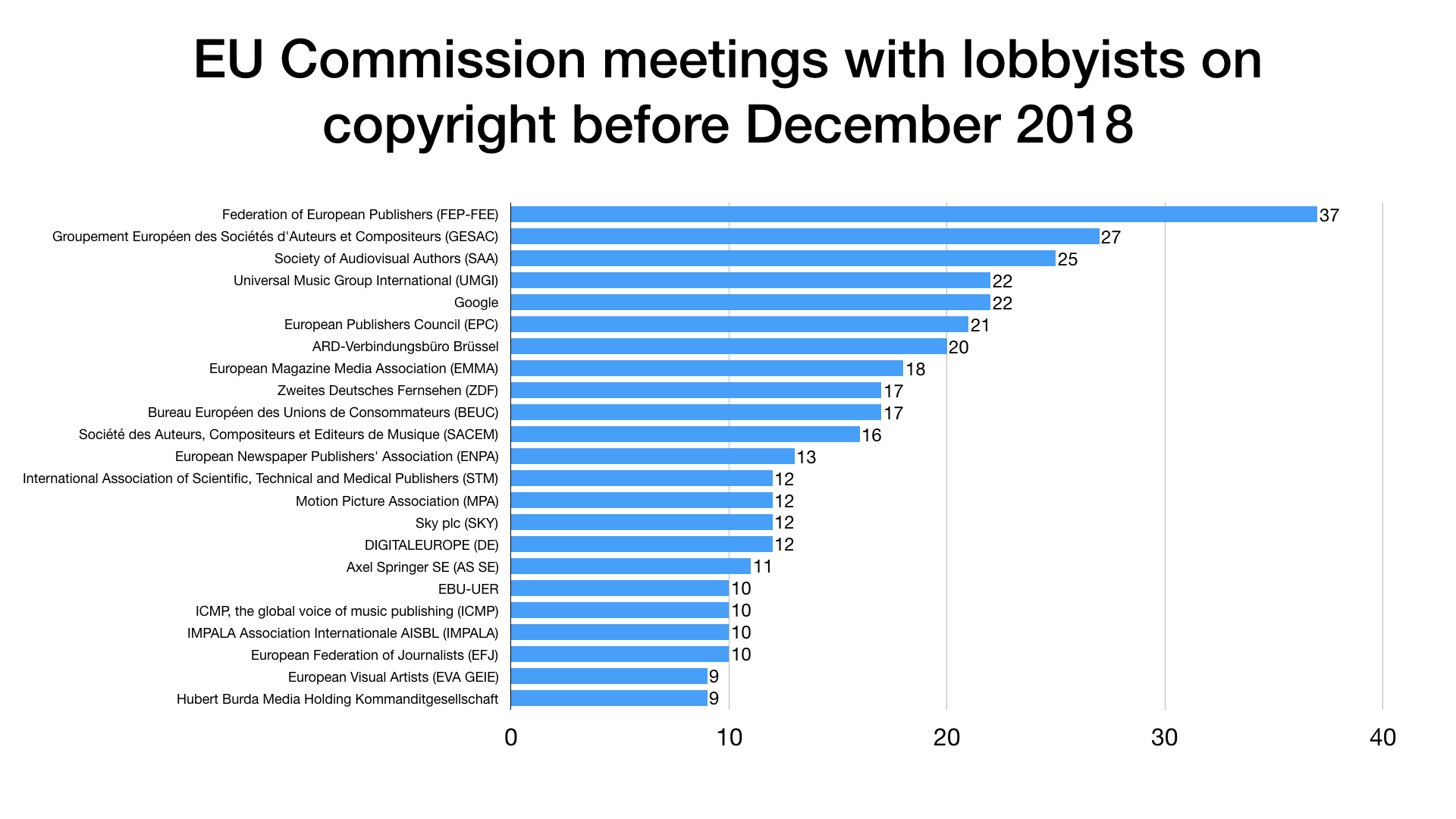Many people, myself included, have followed with great interest the last year’s event as the European Union worked its way through a new directive on copyright, which is likely to have many negative consequences on fair use and the free flow of information on the Internet (included information that has no copyright implications). This is no place to summarize what happened: you can find many great accounts online, like the blog of Pirate MEP Julia Reda. What I found most striking is how no one who had (1) a shred of competence in Internet matters and/or economics and (2) was not set to benefit directly from it, supported the directive. Academics. Civil liberty activists. Large American tech companies. Small European tech companies. No. One. But the copyright lobby pushed really hard, as revealed by the EU lobbying registry. Out of the 25 organizations that held the most meetings on copyright with the Commission in 2018, 23 represented copyright holders (source: Corporate Europe). The vote went ahead, and the lobbyists won, as they tend to do.
Just as the battle for the final vote in April 2019 raged on, I decided to visit the House of European History in Brussels. This is a history museum with a continental perspective, set up as an initiative of the European Parliament. At some point, I got fascinated by an Italian 1930s political propaganda manifesto from the fascist era, so I took out my phone to snap a picture. A steward informed me that taking picture was not allowed.
This piqued my curiosity. Why would it not be allowed? The whole point of the European Parliament investing in this project is for as many Europeans as possible to get acquainted with their common past. Visitors taking pictures and resharing them on social media (or showing them to their families at home) are helping the House of European History fulfill its mission. So I asked the steward “Why is that, sir?”. He could not give an answer, but insisted I was not allowed to take picture. At this point, I replied that if he could not give me a valid reason to comply, I would just refuse to obey him. He went looking for his manager.
The manager was not much help. He, too, was “just obeying orders”. Ironic, I know: we were standing in the section on the totalitarian atrocities. He advised me to put a written complaint to the museum itself. So I went home, and did. And asked again my question:
The House of European History wants to showcase to Europeans their common legacy. We are Europeans, so this our legacy too. Why are we not allowed to share it with my fellow humans? In fact, why are we not encouraged to do so?
The answer came a few days later. The gist of it was this: several of the exhibits are on loan from others museums and institutions. These institutions have different copyright policies, depending on national legislation and other factors. This gives rise to such a tangle of vetos, restrictions and other hindrances that management decided to cover its back and simply forbid taking pictures of anything at all.
In the age of Instagram and Facebook, by this decision the House of European History is crippling its own communicative potential. This is stupid, coward and wasteful of European taxpayer money. And no one tell me it is “rewarding creators”: the person who had designed the fascist manifesto that fascinated me had likely been paid for his work back in 1934, and passed away since. A much better policy would be to only show exhibits that are firmly in the commons.
A month later, the European Parliament went on to approve the even more restrictive copyright directive that right holders lobbyists wanted. Never mind that copyright legislation in Europe is already so restrictive that its own projects cannot get firm traction because of it. This, I think, goes to show how deep European institutions have become lost in trying to accommodate business. Accommodating business (or anyone) is not bad in itself; but it does become bad if, to do it, you lose sight of your strategic aims.
I am a staunch European federalist, but this stuff is impossible to defend. European elections are coming up: I have pledged to outvote candidates and parties who supported this directive. If, like me, you care about this stuff, you can find more information about which candidates to blacklist on https://pledge.eu.
Photo: House of European History. Sue me.

